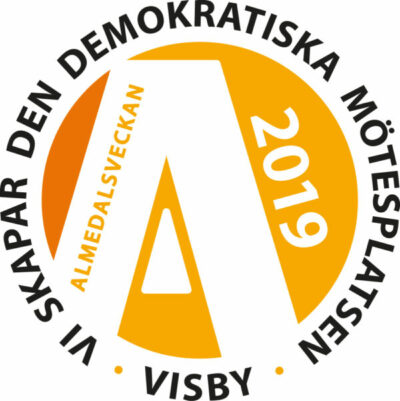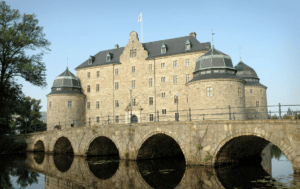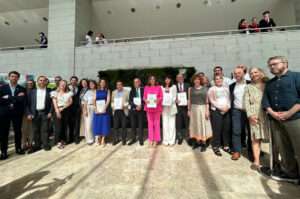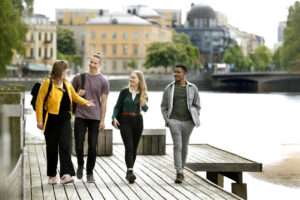This year, Viable Cities participates with its own events and as a co-organizer in others and in some cases as a speaker. Among other things, a seminar focusing on climate-neutral cities will be held on Monday, July 1 at 16.15 with the directors general of Vinnova, the Swedish Energy Agency and Formas and political representatives from Stockholm, Gothenburg, Uppsala and Umeå, followed by a mingle.
Climate-friendly Almedalen
During the week, a campaign will be carried out in collaboration with Uppsala Municipality and others within the framework of the Klimatlätt project, where Almedalen visitors have the opportunity to get a grip on their climate footprint and how this can be reduced. In connection with the mingle after the seminar at Teaterskeppet on Monday, July 1 (17.15), we launch Klimatlätt Almedalen. As a participant, you can get help to measure your emissions and get customized tips on how to reduce your climate footprint. You are also welcome to find out your climate footprint yourself by downloading the app Svalna and joining the group Klimatlätt in Almedalen. At a seminar on Thursday, we will follow up with volunteers and experts.
Mind//Shift Almedalen
During the Almedalen week, Viable Cities is co-organizing Mind//Shift Almedalen where this seminar is one of many events during the week. Mind//Shift is a movement where we want to engage everyone from business and public organisations, to academia and civil society, to focus on our mental well-being.
Mental health is Sweden's most important asset for sustainable social development. This asset, our mental health, is affected by everything from digitalization and diet, to the urban environment and culture. However, we have been talking about and acting on mental health for a long time.
Starting in Almedalen, together with our partners, we want to drive a mental shift, from reactive action to preventive work to strengthen mental health. We see people before roles and value all different perspectives. Employer, employee, entrepreneur, decision maker, parent, child and friend. The goal is to act together, with our shared knowledge and approach the challenge from different perspectives. More info about Mind//Shift Almedalen
Questions
If you have any questions about Viable Cities' participation during Almedalen Week, please email Åsa Minoz.
Who makes the city smarter? - Focus on digital infrastructure?
Monday 1/7 at 10.00 - 10.45, Strandgatan 27, Primes garden, Visby.
Organizer: Clear Channel Scandinavia
Smart, sustainable and inclusive cities depend on new technologies - but technological advances are worthless if they do not benefit the city. Already today, there is digital infrastructure whose potential and capacity is not fully used. The solutions exist, but who will make use of them?
Smart, sustainable and inclusive cities depend on new technologies - but technological progress is worthless if it does not benefit the city and its citizens. Already today, digital infrastructure exists whose potential and capacity is not fully utilized. Can elected officials in cities use digital billboards to break through the thickest filter bubbles? Can they change the behavior of residents from littering to recycling? And in an emergency, can they point the way to safety and help? The solutions to many cities' problems already exist today, but who is taking advantage of them? Theme: Live. This conversation is organized within the framework of the Campus concept - an arena for cross-sectoral conversations, where pipes cross and new solutions and problems are identified. For four days, Prime will open up its garden to bring together relevant stakeholders to address key issues under four themes: Live, Work, Move, Eat. Read more at the link below.
Participants:
-
Olga Kordas, Program Director of Viable Cities, the Strategic Innovation Program for Smart and Sustainable Cities, KTH Royal Institute of Technology (KTH)
-
Johnny Magnusson, Regional Executive Chairman in Region Västra Götaland, Moderates
-
Claes Kugelberg, Chief Operating Officer, Clear Channel Scandinavia
-
Per Grankvist, moderator, journalist and sustainability expert
How can we reduce our carbon footprint? So does World Climate City?
Monday 1/7 at 11.00 - 11.45 Donners plats 6, Verandan, Visby.
Organizer: Uppsala municipality
70% of the world's population is expected to live in cities by 2050. This presents major environmental and climate challenges but also opportunities. Together, municipalities, business and civil society can contribute to a sustainable transition by promoting sustainable lifestyles in cooperation with engaged citizens...?
Uppsala was named Climate City of the Year 2018 by the World Wildlife Fund and is now continuing its work to achieve sustainable development and reduced climate impact. Cities will have a major impact on the future, not least because 70 percent of the world's population is expected to live in cities by 2050. How can citizens' knowledge, participation and involvement in climate and environmental issues be used as a driving force to get closer to the vision of a sustainable city? By showing how the municipality, business and civil society work together to promote sustainable lifestyles and facilitate more sustainable choices in everyday life, Uppsala is taking the lead in the transition to a resource-efficient and sustainable society.
Participants:
-
Björn Sigurdson, Moderator, Climate Strategist, Uppsala Municipality
-
Stefan Sandberg, CEO, Uppsalahem
-
Josefin Wangel, researcher SLU, co-director SLU Urban Futures, SLU
-
Olgas Kordas, Program Manager, Viable Cities
-
Linnéa Haeggström, Campaign Manager, Klimatlätt, Uppsala Municipality.
-
Antje Jackelén, Archbishop, Church of Sweden/Uppsala Cathedral.
How can sustainable urban development contribute to our mental health?
Monday 1/7 at 13:00 - 13:50 Helge Ands kyrkoruin, Norra kyrkogatan 3G.
Organizer: Uppsala municipality
When we talk about cities of the future, there is a strong focus on sustainability. This focus is usually linked to climate and environmental sustainability. But is there also room for discussion on how urban development can contribute to mental health? Can we design cities so that they contribute to mental well-being?
Major issues are woven into our future urban development, such as lifestyle, consumption, mobility and accessibility, built environment and infrastructure. All these issues are intertwined as we approach a new era of digitalization, sharing economy and sustainability. What mental health challenges can and will we face in the development of cities and the environments where we live and have our everyday lives? And what synergies can we find in creating cities where environmental and climate issues and mental well-being are part of a good life for everyone within the planet's borders?
Participants:
-
Mats Hedros, CEO, AMF Fastigheter
-
Olga Kordas, Program Manager, Viable Cities
-
Jesper Lövkvist, Architect, Utopia
-
Sussane Nordling, Politician, Stockholm County Council
-
Stina Carlsson Reich, CEO, itch
How can Swedish cities become climate neutral by 2030? How can we ensure a good life in the city for everyone?
Monday 1/7 at 16.15 - 17.15 Teaterskeppet (Teatersalongen), Visby hamn, Visby.
(Note: You are welcome to participate in the subsequent mingle).
Organizer: Viable Cities
Cities account for 80% of climate emissions and their actions will determine how we succeed in the transition to climate neutrality. This fall, about ten Swedish cities are joining forces to become climate neutral by 2030. How are Swedish cities working together to accelerate this transition?
According to the UN climate panel, humanity is facing an existential challenge. We need to address the climate threat, and it is urgent. Uppsala, Stockholm, Gothenburg and Umeå are among the most ambitious Swedish cities on climate and sustainability issues. They are now aiming to accelerate their climate transition under the Viable Cities mission Climate Neutral Cities 2030. How are cities investing to achieve a faster and more powerful transition? How can cities work together for faster and greater impact? How can Swedish and EU investments in research and innovation support the transformative systemic changes required for climate-neutral cities? Hear cities' plans for climate-neutral cities with a good life for all. Feel free to stay for the mingle afterwards.
Participants:
-
Allan Larsson, Chairman, Viable Cities
-
Olga Kordas, Program Manager, Viable Cities
-
Darja Isaksson, Director General, Vinnova
-
Robert Andrén, Director General, Swedish Energy Agency
-
Ingrid Pettersson, Director General, Formas
-
Indy Johar, System Innovation Expert, Dark Matter Laboratories
-
Axel Darvik, 1st Vice Chairman of the Environment and Climate Committee, (L) City of Gothenburg.
-
Hans Lindberg, Municipal Executive Chairman, (S) Umeå Municipality
-
Rickard Malmström, municipal councillor responsible for climate, environment, nature and streets, (MP) Uppsala municipality.
-
Katarina Luhr, Councillor for Environment and Climate, City of Stockholm.
-
Åsa Minoz, Moderator, Viable Cities
Feel free to stay and mingle with us after the seminar!
How can cities work together on digitalization to contribute to a good life for all citizens?
Tuesday 2/7 at 09.15 - 10.00 Trappgränd 1, arena Stadsutvecklingsdagarna.
Organizer: Arranged in collaboration between Viable Cities, RISE and SKL.
Data is the new gold to create value for sustainable development and quality of life in cities and communities. Today, this development is hindered by the lack of standardization and common frameworks. How can cities work together to use digitalization for a good life for all residents?
Sweden's municipalities and regions have come different ways in their work with data-driven innovation, and there is much we can learn from each other. In an international context, Sweden is only ONE city in size. We need to work smarter together and with other countries to succeed. In the project City as a Platform within the framework of the strategic innovation program Viable Cities, a number of municipalities in Sweden collaborate on the standardization of data management and data-driven innovation in cities. The sibling project Urban Digg Infra, meanwhile, is looking beneath the surface and exploring what might be reasonable requirements for cities' digital infrastructure in the future. An international network is also under construction with similar ambitions. The seminar is based on the City as a Platform and Urban Digg Infra projects and provides different perspectives on the opportunities and challenges that exist: from an individual municipality, nationally and internationally.
Participants
-
Olga Kordas, Program Manager, Viable Cities
-
Claus Popp Larsen, Project Manager City as a Platform, RISE
-
Alex Jonsson, Project Manager Urban Digg Infra, KTH.
-
Ulrika K Jansson, Director of Public Works, Örebro Municipality.
-
Mikael Anneroth, Expert Human and Society perspective of ICT, Ericsson
-
Thérèse Balksjö, moderator, RISE
Which key issues in the transition to sustainable cities have dominated the week?
Thursday 4/7 at 08.30 - 09.30 Teaterskeppet (Stora salongen), Visby hamn, Visby.
Organizer: Arranged in collaboration between Viable Cities, Sustainable Innovation, Botkyrkabyggen, Future Position X, Smart Housing Småland, Internet of things Sweden and IQ Samhällsbyggnad.
The Almedalen Week is an important forum for sustainable change and much of it is about sustainable cities. How can we transition to climate-neutral cities? How do we make investments that promote social sustainability? What should the digital infrastructure look like? How can citizen engagement be promoted in this?
Together over a good breakfast, we summarize the seminars, statements and key learnings from the week. Experts act as spotters and begin with their observations and insights on the issues surrounding smart and sustainable cities that have been in focus during the week. Then you as a participant can share your impressions with other participants. Finally, we summarize the key issues that stood out during the week. We also make a scan among the organizers participants which are the next steps during the autumn and then around these key issues.
Participants
-
Thomas Sundén, CEO, Sustainable Innovation
-
Olga Kordas, Program Manager, Viable Cities
-
Anna Fjällström, CEO, Future Position Xd
-
Chris Österlund, CEO, Botkyrkabyggen
-
Jin Moen, Program Manager, IoT Sweden
-
Mikael Ludvigsson, Process Manager, Smart Housing Småland
-
Anders Carlsson, Process Manager, Visual Sweden
-
Anita Aspegren, CEO, IQ Samhällsbyggnad
Citizen engagement for climate-neutral cities - how can we lighten the carbon footprint?
Thursday 4/7 at 16.00 - 16.45 Gotlands museum, Strandgatan 14, Aktuell Hållbarhets Arena.
Organizer: Arranged in collaboration between Coompanion, Viable Cities, Social Venture Network (SVN Sweden).
Can digital platforms for more climate-smart everyday practices contribute to a more sustainable Almedalen Week? Visitors during the week will have transportation, accommodation and practical everyday life. The environmental and climate impact increases significantly with lots of people in a small place?
40 000 people are visiting Visby this week, a small tourist town with a rich cultural heritage and limited space and resources. There are opportunities to test new services and behaviors that need to become more sustainable. The week has been an experimental workshop for sustainable cities as we engaged visitors to make climate-smart choices in Visby. Klimatlätt is a project within the Viable Cities program where Uppsala Municipality, together with a number of actors, creates engagement around climate and sustainability and helps more people make sustainable choices in their everyday lives. In 2018, Uppsala was named Global Climate City of the Year, an award from WWF. In collaboration with Klimatlätt, Almedalen visitors have been able to test the Svalna app, get a grip on their climate footprint and explore and come up with ideas on what can facilitate more climate-smart everyday practices. Here we follow up with experts and visitors who acted as test pilots to see how it went and we also look at opportunities for the future.
Participants
-
Sophie Nachemson Ekwall, Global Challenge, Stockholm School of Economics.
-
Linnea Häggström, Campaign Manager, Uppsala Municipality, Climate Light.
-
Björn Sigurdsson, Climate Strategist, Uppsala municipality
-
Åsa Minoz, Communications Strategist, Viable Cities
-
Olga Kordas, Program Manager, Viable Cities
-
Stina Algotsson, CEO, BFUF
-
Marcus Bergh, Coompanion




